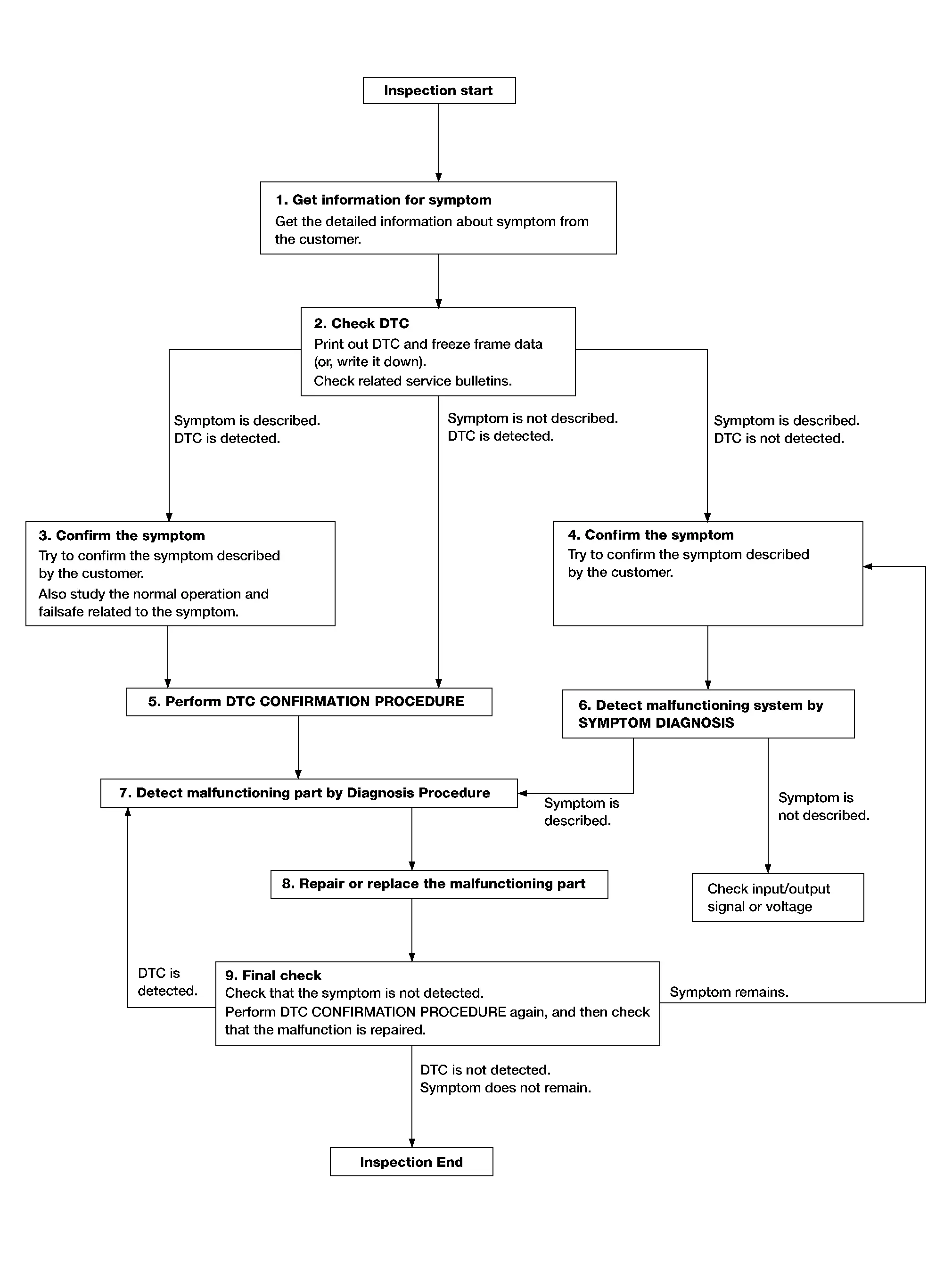Nissan Pathfinder: Power Control System - Basic Inspection
Diagnosis and Repair Work Flow Nissan Pathfinder 5th Gen
Work Flow
OVERALL SEQUENCE

DETAILED FLOW
GET INFORMATION FOR SYMPTOM
-
Get detailed information from the customer about the symptom (the condition and the environment when the incident/malfunction occurs).
-
Check operation condition of the component or system that is malfunctioning.
>>
GO TO 2.
CHECK DTC
 CONSULT
CONSULT
-
Check DTC.
-
Perform the following procedure if DTC is detected:
-
Record DTC and freeze frame data (print them out).
-
Erase DTC.
-
Study the relationship between the cause detected by DTC and the symptom described by the customer.
-
-
Check related service bulletins for information.
Are any symptoms described and any DTC detected?
Symptom is described, DTC is detected>>GO TO 3.
Symptom is described, DTC is not detected>>GO TO 4.
Symptom is not described, DTC is detected>>GO TO 5.
CONFIRM THE SYMPTOM
Try to confirm the symptom described by the customer.
Also study the normal operation and fail-safe related to the symptom.
Verify relation between the symptom and the condition when the symptom is detected.
>>
GO TO 5.
CONFIRM THE SYMPTOM
Try to confirm the symptom described by the customer.
Verify relation between the symptom and the condition when the symptom is detected.
 NOTE:
NOTE:
Freeze frame data is useful if the DTC is not detected.
>>
GO TO 6.
PERFORM DTC CONFIRMATION PROCEDURE
 CONSULT
CONSULT
Perform DTC CONFIRMATION PROCEDURE for the detected DTC, and then check that DTC is detected again. At this time, always connect CONSULT to the Nissan Pathfinder vehicle, and check self diagnostic results in real time.
If two or more DTCs are detected, refer to DTC Inspection Priority Chart (BCM) or DTC Inspection Priority Chart (Intelligent Key unit), and determine trouble diagnosis order.
Is DTC detected?
YES>>GO TO 7.
NO>>Refer to Intermittent Incident.
DETECT MALFUNCTIONING SYSTEM BY SYMPTOM DIAGNOSIS
 CONSULT
CONSULT
Detect malfunctioning system according to SYMPTOM DIAGNOSIS based on the confirmed symptom in step 4, and determine the trouble diagnosis order based on possible causes and symptom.
Is the symptom described?
YES>>GO TO 7.
NO>>Monitor input data from related sensors or check voltage of related module terminals using CONSULT.
DETECT MALFUNCTIONING PART BY DIAGNOSIS PROCEDURE
Inspect according to Diagnosis Procedure of the system.
Is malfunctioning part detected?
YES>>GO TO 8.
NO>>Refer to Intermittent Incident.
REPAIR OR REPLACE THE MALFUNCTIONING PART
 CONSULT
CONSULT
-
Repair or replace the malfunctioning part.
-
Reconnect parts or connectors disconnected during Diagnosis Procedure again after repair and replacement.
-
Check DTC. If DTC is detected, erase it.
>>
GO TO 9.
FINAL CHECK
 CONSULT
CONSULT
When DTC is detected in step 2, perform DTC CONFIRMATION PROCEDURE again, and then check that the malfunction is repaired securely.
When symptom is described by the customer, refer to confirmed symptom in step 3 or 4, and check that the symptom is not detected.
Is DTC detected and does symptom remain?
YES>>DTC is detected:GO TO 7.
YES>>Symptom remains:GO TO 4.
NO>>Inspection End.
Procedure for Temporarily Disabling the Ignition Battery Saver System Nissan Pathfinder 2026
Description
The ignition battery saver system can be temporarily disabled, without using CONSULT, to prevent it from functioning when performing trouble diagnosis. Refer to Work Procedure.
Work Procedure
-
The ignition battery saver system can be temporarily disabled, without using CONSULT, to prevent it from functioning when performing trouble diagnosis.
 NOTE:
NOTE:
When ignition battery saver is disabling, the operation of push-button ignition switch is not accepted for less than 2 seconds.
-
To resume ignition battery saver system, press and hold the push-button ignition switch continuously for 3 seconds or more when all of the following conditions are satisfied (ignition switch ON -> OFF):
-
Shift selector: Except P or N position
-
Brake pedal: Not depressed
-
WORK PROCEDURE
-
Ignition switch OFF.
-
Without depressing the brake pedal, press the push-button ignition switch.
-
With depressing the brake pedal, shift the shift selector in another position except P or N.
-
Without depressing the brake pedal, press and hold the push-button ignition switch continuously for 3 seconds or more.
-
Shift the shift selector to P position to stop the P position warning (buzzer).
 NOTE:
NOTE:
If you are not concerned about the P position warning (buzzer) volume and battery discharge, this is not a necessary step.
>>
Work End.

Nissan Pathfinder (R53) 2022-2026 Service Manual
Basic Inspection
Contact Us
Nissan Pathfinder Info Center
Email: info@nipathfinder.com
Phone: +1 (800) 123-4567
Address: 123 Pathfinder Blvd, Nashville, TN 37214, USA
Working Hours: Mon–Fri, 9:00 AM – 5:00 PM (EST)
